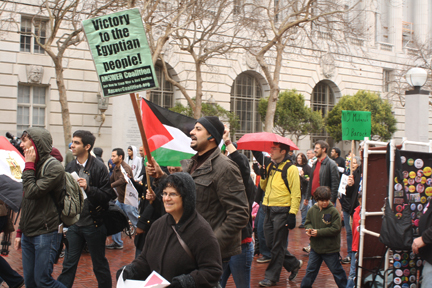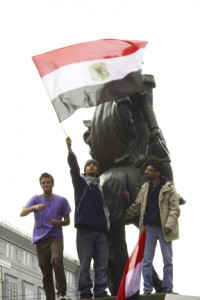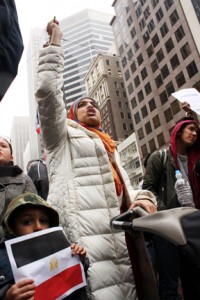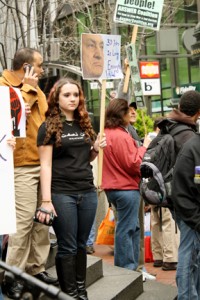Shouts of support for Egypt and Tunisia resonate from San Francisco

By Alex Emslie
The Guardsman
About 700 demonstrators from around the Bay Area charged up Market Street to San Francisco’s UN Plaza on Jan. 29

in support of popular, youth-led uprisings in Tunisia and Egypt.
The crowd echoed the demands in Egypt, which have distilled from anger over record unemployment, inflation and civil rights abuses to calls for the country’s 30-year president Hosni Mubarak to step down.
“I’m in solidarity with Egyptians, my people, and to tell them that we are with them 100 percent,” Maha Abuelmagd told The Guardsman. “It’s also a message to the United States that they need to take some more action in regards to what’s going on in Egypt.”
‘Wick to the Powder Keg’
Protests in Tunisia started Dec. 17, 2010, the same day 26-year-old Mohammed Bouazizi set himself on fire outside the governor’s office of his hometown, Sidi Bouzid. Bouazizi’s fruit and vegetable cart was confiscated and officials refused to hear his complaints. He died of complications from his burns Jan. 4, but his suicide-protest inspired Tunisians, and now Egyptians, to rebellion.
“Tunisia was the wick to the powder keg,” Abdel-Malik Ali told The Guardsman at the rally Jan. 29. “When Muslims saw a man set himself on fire, it was just so bad. For the government to force someone into that desperation, it was just too much to take.”
Former Tunisian President Zine al-Abidine Ben Ali fled his country to Saudi Arabia on Jan. 14 following nearly a month of violent clashes between protesters and police. Tunisian Prime Minister Mohamed Ghannouchi assumed the presidency but vowed Jan. 21 to quit politics once general elections are held and a new president and legislature elected.
San Franciscans Rally for Egypt – The Guardsman TV – February 04, 2011 from The Guardsman on Vimeo.
San Franciscans hold a march downtown in support of the anti-Mubarak protests in Egypt. Kay Recede interviews supporters to find out the specific demands of the San Franciscan protesters.
‘Spreading Like Wild Fire’
Inspired by the popular uprising’s success in Tunisia, Egyptian activists staged a massive protest in Cairo’s Tahrir Square on Jan. 25, which they labeled the “Day of Rage.”

“A lot of youth in the Internet movement asked that people go out in a peaceful demonstration on Jan. 25. They were asking that he [Mubarak] go away,” Abuelmagd told The Guardsman. “That’s how it’s related to Tunisia — we owe them the revolution.”
Abuelmagd, a mother of two and a college student hoping to transfer to San Jose State, moved to the Bay Area from Egypt six years ago.
“I’ve never known a president except Mubarak,” she said. “He’s been president my entire adult life, and he turned Egypt into a police state.”
The crowd at UN Plaza included many Egyptian-Americans like Abuelmagd, but its numbers swelled with people from other countries in the region, like City College students Mokhtar Alkhanshali and Samar Aburahma.
“The people want change, and I truly believe that after the Tunisian president was overthrown, people are starting to see the light at the end of the tunnel,” said Alkhanshali, who is Yemeni and a member of the City College Muslim Student Association. “People are starting to wake up now. We have power. We can change our government.”
Abuarahma, who is Palestinian, hoped the uprisings in Tunisia and Egypt would inspire people in Gaza.
“It’s spreading like wild fire,” she said. “Now it’s like a wake-up call to the Palestinians. A revolution like this doesn’t come every day. It’s in our hands now.”
Mubarak’s Crackdown
Protests in several major Egyptian cities continue to rampage. On Jan. 28 tens of thousands of protesters exploded from the country’s mosques after the noon prayer. Battles between parliamentary security police officers and protesters stretched into the night.
Parliamentary police withdrew from Egypt’s major cities during the night of Jan. 28, and protesters set fire to police stations and the ruling National Democratic Party headquarters in Cairo.
Mubarak unleashed the Egyptian army to establish order on Jan. 28.
“It’s getting bloodier each day because the police have fled the country,” Abuelmagd told The Guardsman. “Some of them refuse to be in service anymore. They were protecting him, and when his regime fell down, they did not have a regime to protect anymore and they stopped protecting the Egyptian people.”
Mubarak also blacked out much of the country’s Internet and wireless communications and dismissed his cabinet following the massive protest on Jan. 28. He refused to step down himself, however, and named a new cabinet on Jan. 31. Mubarak revoked Al Jazeera’s license to broadcast from Egypt and shut down the news organization’s bureau in Cairo.

Protesters have called for a “march of millions” on Feb. 1 in hopes of delivering the death blow to Mubarak’s now shattered regime. An official spokesman for the Egyptian army said Jan. 31 that soldiers would not fire on demonstrators.
“Freedom of expression through peaceful means is guaranteed to everybody,” the army spokesman was quoted in the New York Times.
U.S. Interests
The uprisings have put the Obama administration, which provides Egypt with an annual $1.5 billion for mostly military purposes, in a difficult position.
Obama pressured Mubarak to respond to the protests peacefully, but he has stopped short of calling for the 30-year president to resign. Al Jazeera English reported that wounds on the corpses of protesters from Jan. 28 looked like bullet holes, and Reuters reports the death toll from the uprisings in Egypt now tops 100.
Despite his reputation in Egypt for brutality and secrecy, Mubarak is a long-time ally of the U.S., from the Soviet Union days through the war on terrorism.
“This isn’t a choice between the government and the people of Egypt,” White House Spokesman Robert Gibbs told reporters Jan. 27. “President Mubarak has for several decades been a close and important partner with our country.”
SF State student Omar Ali called for a change in U.S. dealings with the Middle East during the San Francisco rally on Jan. 29.
“The U.S. has played a double standard saying they want democracy in the whole region,” he said. “At the same time, they are funding and supporting a dictatorship, knowing that there are human rights violations happening every day.”
San Francisco rally organizers are calling for Egyptian and Tunisian uprising supporters to attend the city board of supervisors meeting Feb. 1 at 2 p.m. A worldwide demonstration in support of Egypt and Tunisia’s people is scheduled for Feb. 5, with the San Francisco portion scheduled for 1 p.m. at UN Plaza. Check the Facebook page: SF Demo & Rally in Solidarity with The Egyptian and Tunisian Protests.
Overseas reporting compiled from Al Jazeera English, The New York Times, The Associated Press, The San Francisco Chronicle, Reuters and The International Business Times

Comments are closed.